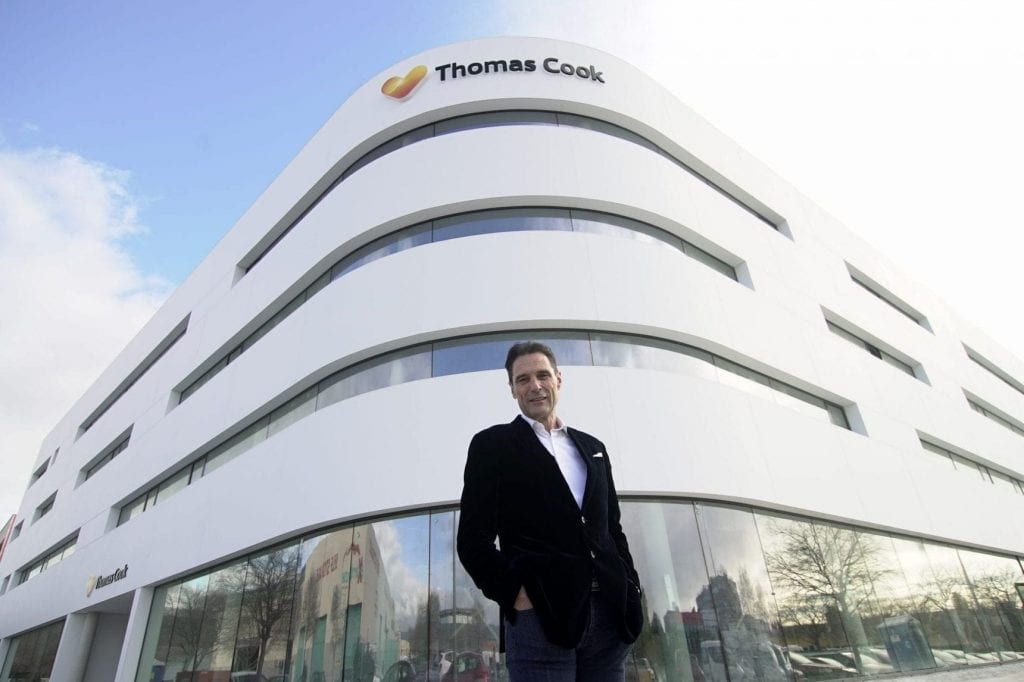What Went Wrong at Thomas Cook in 2018?

Skift Take
During this time last year Thomas Cook CEO Peter Fankhauser was in an ebullient mood. He had presided over a “milestone” year with profit up, debt cut and another dividend for shareholders.
“I strongly believe that our focus on customers, quality and service is key to our success, positioning us to deliver long-term sustainable profitable growth,” he said at the time.
Twelve months later, the company’s share price has fallen to its lowest level in six years, having issued multiple profit warnings, culminating with an annual loss of $208 million (£163 million.)
This year was challenging for many European travel businesses. Warm summer weather, air traffic control strikes, and rising fuel prices all played their part but Thomas Cook suffered more than most.
Its struggles will remind many in the industry of its disastrous 2011, where it came close to going out of business.
How many of the company’s problems are self-inflicted and how many are down to things out of its control?
What Thomas Cook Said Went Wrong
When announcing its full-year results, Thomas Cook pointed out a number of factors that contributed to an overall slide into the red.
The first six months of the year were pretty good and left it in a “positive position” but after that things took a turn for the worse.
A heatwave kicked in in May, suppressing demand and leading to poorer margins in the “lates” period, the time of year when customers buy holidays close to departure.
Thomas Cook also suffered from competition in the key Spanish market as well as industry-wide air traffic control disruption. On top of that there were those pesky “separately disclosed items” totalling £153 million. These spanned a variety of subjects, including store closures, redundancy payments and start-up costs.
Taking the Heat
Blaming the hot weather was a familiar line from travel companies across Europe in the mid part of the year.
Tour operators like Thomas Cook make a large portion of their profits in the summer months so anything that upsets that can turn a good year into a bad one. A sustained period of hot weather has the potential to persuade people booking close to departure not to buy that trip abroad and instead spend it in the UK, Sweden or Germany.
“When the heatwave hit and demand fell it was kind of left holding the baby,” said Richard Clarke, an analyst at Bernstein.
The hot weather can be a particular problem in the UK. This is Thomas Cook’s second largest tour operator source market, contributing around 20 percent of top line revenue. A significant amount of these bookings come in the last six to eight weeks before departure.
“Because the UK is such a late booking market once you suffer a problem, then if you’ve not got sales in then it's very difficult to recover from it,” said a senior industry source.
A UK Problem?
Although it was a challenging year across the board for Thomas Cook, the Group Airline, Continental Europe and Northern Europe divisions all made underlying profits only the UK made a loss.
To try and turn this around, the company is implementing a series of measures it hopes will lead to a return to profitability, such as pushing its own brand hotels and in-house financial services division.
A few days after the results, the boss of Thomas Cook’s UK business left to join German tour operator Der Touristik. The division’s former boss, Chris Mottershead, will return to take charge, alongside his role as chief of product and operations.
Thomas Cook said the departure was due to personal reasons and not connected to the poor performance.
A change in local leadership might not be enough to combat the economic dark clouds gathering over the UK.
Brexit is only a few months away and consumer confidence remains low. GfK’s Consumer Confidence Index decreased by three points in November 2018 to -13 (it’s been in negative territory for the past twelve months).
Perhaps most worrisome for Thomas Cook is the Major Purchase Index that dropped into negative territory. This doesn't include holidays but is a good indicator of where people stand on spending significant amounts of money.
“They’re a very upbeat bunch holiday retailers so they’re not going to give you the bad news quickly, let’s put it that way, but when you look at the macro stuff the top down stuff, most of it's not very helpful,” said Mark Brumby an analyst at Langton Capital.
Rivals
As a whole, it’s easy to see why Thomas Cook has struggled but the problem is, its rivals are not suffering nearly as badly.
Take Dart Group, the owner of airline Jet2 and tour operator Jet2holidays. Arguably it should be in a worse position as it is entirely UK focussed and doesn’t have the luxury of multiple source markets like Thomas Cook and market-leader TUI Group.
In November, Dart Group's leisure travel division reported a half-year operating profit increase of 69 percent to $445 million (£347.8 million.). On the Beach posted a more modest annual pre-tax profit of $33.3 million (£26.1 million) but this was still up 23.7 percent. And TUI coped much better with the adverse conditions – operating profit grew 3.3 percent to $1.2 billion (€1.1 billion.)
Thomas Cook’s business model puts it in a difficult position – in a way it falls between two stools.
Big rival TUI, owns or controls a large proportion of what it sells and offers holidays that customers can’t buy elsewhere.
“Their product is differentiated to what you can get in the rest of the market – Thomas Cook's is much less so. So their product is naturally more commoditized,” said Clarke.
As an online travel agency, On the Beach can be a lot more flexible. Jet2 is perhaps the best comparison but even it has a couple of advantages, such as its lack of retail stores, which in today's retail environment can be a financial drain.
“Jet2 is coming at this with a similarly commoditized product…but a lower cost base and that’s damaging for Thomas Cook because they have to compete and they have to compete even more in a squeezed market when supply is higher than demand and you're chasing those customers harder. And if you’ve got the same product as everyone else but you can't sell it at the same profit margin you’re not in a fantastic situation,” said Bernstein's Clarke.
What Next?
Thomas Cook’s steep share-price decline makes it an easier takeover target, the problem is the debts and liabilities. Would a rival really want to take these on?
There were rumours of a potential airline sale a while back. Asian powerhouse Fosun is a strategic partner and has a minority stake, might it want to go all in? Perhaps not given it is currently IPOing its tourism division.
“They’re a much stronger and robust business than they were five years ago, I’d like to think so,” said the senior industry figure.
“I would say at that share price they’re currently at they must be exposed to the risk that someone says ‘let’s take a punt on them’.”
CEO Fankhauser is generally well-regarded in the industry and probably needs to stay put to help reassure investors. The company announced chief financial officer Bill Scott was leaving in September, on the same day it revealed one of its profit warnings.
The key thing for Thomas Cook to do now is ride out the quieter winter period and retool its business for next year. Executives will be hoping summer 2019 is a washout rather than another scorcher.




